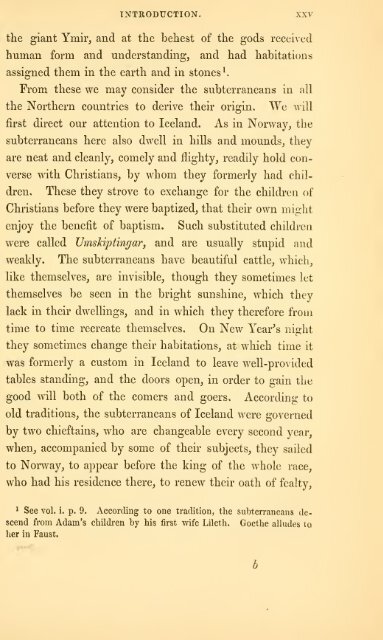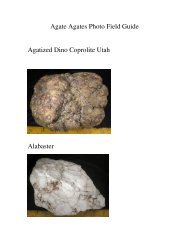- Page 2: .ZB:o(i ^^ PRINCETON, N. J. Zfi^ /)
- Page 8 and 9: PRINTED BY RICHARD TAYLOR, RED LION
- Page 10 and 11: IV CONTENTS. Page The ilore-Trold 2
- Page 12 and 13: VI CONTENTS. Page Elf-Folk 116 The
- Page 14 and 15: Vlll CONTENTS. Of Dragons Page 207
- Page 16 and 17: X CONTENTS. Page The Church at Erri
- Page 18 and 19: Xll INTRODUCTION. from the testimon
- Page 20 and 21: XIV INTRODUCTION. together with the
- Page 22 and 23: XVI INTRODUCTION. the North, the hi
- Page 24 and 25: XVIU INTRODUCTION. even more freque
- Page 26 and 27: XX INTRODUCTION. seems rather to ha
- Page 28 and 29: XXll INTRODUCTION. as sacred. No su
- Page 32 and 33: ; XXvi INTRODUCTION. and render an
- Page 34 and 35: XXVlll INTRODUCTION. mernly by moon
- Page 36 and 37: 2 NORWEGIAN TRADITIONS. having been
- Page 38 and 39: 4 NORWEGIAN TRADITIONS. The Jutul i
- Page 40 and 41: •'* NORWEGIAN TRADITIONS. without
- Page 42 and 43: O NORWEGIAN TRADITIONS. not to be t
- Page 44 and 45: 10 NORWEGIAN TRADITIONS. II. not lo
- Page 46 and 47: 12 NORWEGIAN TRADITIONS. infantas b
- Page 48 and 49: a 14 NORWEGIAN TRADITIONS. THE OIES
- Page 50 and 51: 16 NORWEGIAN TllADITlOXS. the child
- Page 52 and 53: 18 NORWEGIAN TRADITIONS. Of all the
- Page 54 and 55: ; 20 NORWEGIAN TRADITIONS. pinch pe
- Page 56 and 57: — 22 NORWEGIAN TRADITIONS. dashin
- Page 58 and 59: 24 NORWEGIAN TRADITIONS. place a so
- Page 60 and 61: 26 NORWEGIAN TRADITIONS. punishment
- Page 62 and 63: 28 NORWEGIAN TRADITIONS. under wate
- Page 64 and 65: 30 NORWEGIAN TRADITIONS. which wind
- Page 66 and 67: 32 NORWEGIAN TRADITIONS. Dragon^s H
- Page 68 and 69: 34 NORWEGIAN TRADITIONS. as they co
- Page 70 and 71: 36 NORWEGIAN TRADITIONS. to his hon
- Page 72 and 73: 38 NORWEGIAN TRADITIONS. habitants,
- Page 74 and 75: — ! — — — ! 40 NORWEGIAN TR
- Page 76 and 77: — ! — 42 NORWEGIAN TRADITIONS.
- Page 78 and 79: 44 NORWEGIAN TRADITIONS. trothed to
- Page 80 and 81:
46 NORWEGIAN TRADITIONS. Hagen, who
- Page 83 and 84:
SCANDINAVIAN POPULAR TRADITIONS. II
- Page 85 and 86:
SWEDISH TRADITIONS. 51 iii'e, like
- Page 87 and 88:
the other gods. SWEDISH TRADITIONS.
- Page 89 and 90:
SWEDISH TRADITIONS, OU following is
- Page 91 and 92:
; SWEDISH TRADITIONS. 57 Dwarfs. Th
- Page 93 and 94:
SWEDISH TRADITIOxXS. 59 was a trian
- Page 95 and 96:
SWEDISH TRADITIONS. 61 whose descen
- Page 97 and 98:
SWEDISH TRADITIONS. 63 stretched le
- Page 99 and 100:
— — SWEDISH TRADITIONS. 65 : pl
- Page 101 and 102:
SWEDISH TRADITIONS. D/ there saw hi
- Page 103 and 104:
SWEDISH TRADITIONS. 69 in full plum
- Page 105 and 106:
SWEDISH TRADITIONS. 71 which the Hc
- Page 107 and 108:
SWEDISH TRADITIONS. 73 ' meadow ben
- Page 109 and 110:
^ SWEDISH TRADITIONS. 75 The Skogsr
- Page 111 and 112:
SWEDISH TRADITIONS. 7/ ; In West Go
- Page 113 and 114:
SWEDISH TRADITIONS. /V greatly at h
- Page 115 and 116:
. ; SWEDISH TilADITIOXS. 81 The Str
- Page 117 and 118:
SWEDISH TRADITIONS. : ^3 Having thu
- Page 119 and 120:
SWEDISH TRADITIONS. 85 : evident tr
- Page 121 and 122:
SWEDISH TRADITIONS. 87 bridal gift^
- Page 123 and 124:
SWEDISH TRADITIONS. 89 '^ to him :
- Page 125 and 126:
SWEDISH TRADITIONS. 91 ing SO liber
- Page 127 and 128:
SWEDISH TRADITIONS. 93 on the ear f
- Page 129 and 130:
SWEDISH TRADITIONS. 95 travellers b
- Page 131 and 132:
SWEDISH TRADITIONS. 9/ " The heathe
- Page 133 and 134:
; SWEDISH TRADITIONS. 99 path, came
- Page 135 and 136:
SWEDISH TRADITIONS. ]0I borrowed ha
- Page 137 and 138:
SWEDISH TRADITIONS. 103 ' time when
- Page 139 and 140:
SWEDISH TRADITIONS. 105 2 Grimm, D.
- Page 141 and 142:
— SWEDISH TRADITIONS. 107 of this
- Page 143 and 144:
SWEDISH TRADITIONS. 109 9. For the
- Page 145 and 146:
SWEDISH TRADITIONS. Ill 37. Tor the
- Page 147:
. SWEDISH TRADITIONS. 113 64. If a
- Page 150 and 151:
116 DANISH TRADITIONS. were not yet
- Page 152 and 153:
; 118 DANISH TRADITIONS. In Laaneho
- Page 154 and 155:
120 DANISH TRADITIONS. spades, they
- Page 156 and 157:
122 DANISH TRADITIONS. upon a lad,
- Page 158 and 159:
124 DANISH TRADITIONS. while steali
- Page 160 and 161:
126 DANISH TRADITIONS. saw the whol
- Page 162 and 163:
; 128 DANISH TRADITIONS. Fru Mette.
- Page 164 and 165:
130 DANISH TRADITIONS. swarmed with
- Page 166 and 167:
— 132 DANISH TRADITIONS. SKOTTE.
- Page 168 and 169:
134 DANISH TRADITIONS. supposed wif
- Page 170 and 171:
136 DANISH TRADITIONS. ELLEVILDE, O
- Page 172 and 173:
138 DANISH TRADITIONS. and merrimen
- Page 174 and 175:
140 DANISH TRADITIONS. room and saw
- Page 176 and 177:
142 DANISH TRADITIONS. had acquired
- Page 178 and 179:
144 DANISH TRADITIONS. In Borberg c
- Page 180 and 181:
! 146 DANISH TRADITIONS. at a banqu
- Page 182 and 183:
; 148 DANISH TRADITIONS. TROLLS IN
- Page 184 and 185:
150 DANISH TRADITIONS. was disadvan
- Page 186 and 187:
152 DANISH TRADITIONS. vehicle, and
- Page 188 and 189:
154 DANISH TRADITIONS. Troll tlicre
- Page 190 and 191:
156 DANISH TRADITIONS. they conclud
- Page 192 and 193:
158 DANISH TRADITIONS. asked the sk
- Page 194 and 195:
160 DANISH TRADITIONS. day, when th
- Page 196 and 197:
163 DANISH TRADITIONS. In the paris
- Page 198 and 199:
;: 164 DANISH TRADITIONS. large poo
- Page 200 and 201:
: 166 DANISH TRADITIONS. THE KIRKEG
- Page 202 and 203:
168 DANISH TRADITIONS. at dusk it o
- Page 204 and 205:
170 DANISH TRADITIONS. out, that sh
- Page 206 and 207:
; 172 DANISH TRADITIONS. a Merman r
- Page 208 and 209:
174 DANISH TRADITIONS. somewhat sim
- Page 210 and 211:
176 DANISH TRADITIONS. accordingly
- Page 212 and 213:
: 178 T)ANISH TRADITIONS. cook. Now
- Page 214 and 215:
180 DANISH TRADITIONS. ing three ha
- Page 216 and 217:
183 DANISH TRADITIONS. ample provis
- Page 218 and 219:
184 DANISH TRADITIONS. he had seen
- Page 220 and 221:
186 DANISH TRADITIONS. off the floo
- Page 222 and 223:
188 DANISH TRADITIONS. Two miles fr
- Page 224 and 225:
190 DANISH TRADITIONS. the mouth of
- Page 226 and 227:
192 DANISH TRADITIONS. was a witch,
- Page 228 and 229:
194< DANISH TRADITIONS. wind for th
- Page 230 and 231:
196 DANISH TRADITIONS. One night wh
- Page 232 and 233:
198 DANISH TRADITIONS. peasant, ''
- Page 234 and 235:
200 DxiNISH TRADITIONS. the king, o
- Page 236 and 237:
202 DANISH TRADITIONS. niy thanks f
- Page 238 and 239:
204 DANISH TRADITIOXS. took the adv
- Page 240 and 241:
206 DANISH TRADITIONS. and who taki
- Page 242 and 243:
: — 208 DANISH TRADITIONS. pile t
- Page 244 and 245:
210 DANISH TRADITIONS. THE CHURCH-L
- Page 246 and 247:
212 DANISH TRADITIONS. THE BASILISK
- Page 248 and 249:
: 214 DANISH TRADITIONS. piety of t
- Page 250 and 251:
216 DANISH TRADITIONS. There dwelt
- Page 252 and 253:
; .?18 DANISH TRADITIONS. with it,
- Page 254 and 255:
220 DANISH TRADITIONS. HISTORICAL.
- Page 256 and 257:
;: 222 DANISH TRADITIONS. washed hi
- Page 258 and 259:
224 DANISH TRADITIONS. after the ki
- Page 260 and 261:
2.26 DANISH TRADITIONS. he was slai
- Page 262 and 263:
228 DANISH TRADITIONS. - DANNEBROG
- Page 264 and 265:
230 DANISH TRADITIONS. fell on his
- Page 266 and 267:
232 DANISH TRADITIONS. — from his
- Page 268 and 269:
234 DANISH TRADITIONS. '' Denmark^
- Page 270 and 271:
236 DANISH TRADITIONS. QUEEN HELVIG
- Page 272 and 273:
238 DANISH TRADITIONS. OF HISTORICA
- Page 274 and 275:
240 DANISH TRADITIONS. soldier. Ris
- Page 276 and 277:
242 DANISH TRADITIONS. ciilarly of
- Page 278 and 279:
244 DANISH TRADITIONS. JMagister Ni
- Page 280 and 281:
246 DANISH TRADITIONS. given sign s
- Page 282 and 283:
248 DANISH TRADITIONS. transformed
- Page 284 and 285:
250 DANISH TRADITIONS. for. While t
- Page 286 and 287:
! 252 DANISH TRADITIONS. the lid fa
- Page 288 and 289:
251 DANISH TRADITIONS. south bridge
- Page 290 and 291:
256 DANISH TRADITIONS. to find the
- Page 292 and 293:
258 DANISH TRADITIONS. burned a lio
- Page 294 and 295:
260 DANISH TRADITIONS. Valdemar, in
- Page 296 and 297:
262 DANISH TRADITIONS. animal would
- Page 298 and 299:
264 DANISH TRADITIONS. one of the m
- Page 300 and 301:
266 DANISH TRADITIONS. " ST^RK OLGE
- Page 302 and 303:
268 DANISH TRADITIONS. certain secr
- Page 304 and 305:
— — 270 DANISH TRADITIONS. who
- Page 306 and 307:
272 DANISH TRADITIONS. year^ flying
- Page 308 and 309:
; Ji74 DANISH TRADITIONS. 25. When
- Page 310 and 311:
276 DANISH TRADITIONS. return on hi
- Page 313 and 314:
INDEX. A. AaLBORG, secret passages
- Page 315 and 316:
; INDEX. 281 Sweden, 56 ; one build
- Page 317 and 318:
; ; INDEX. 283 Rat-hunter, account
- Page 322:
7l«i 20 '5^ Date Due #i:i -v^ w^r


















